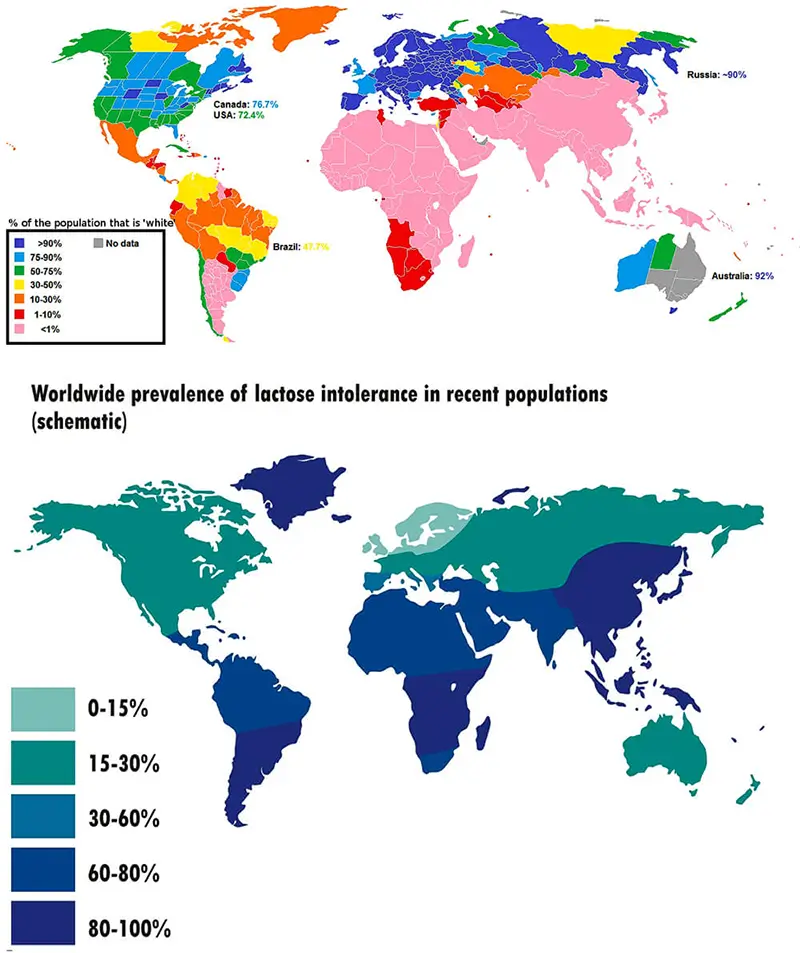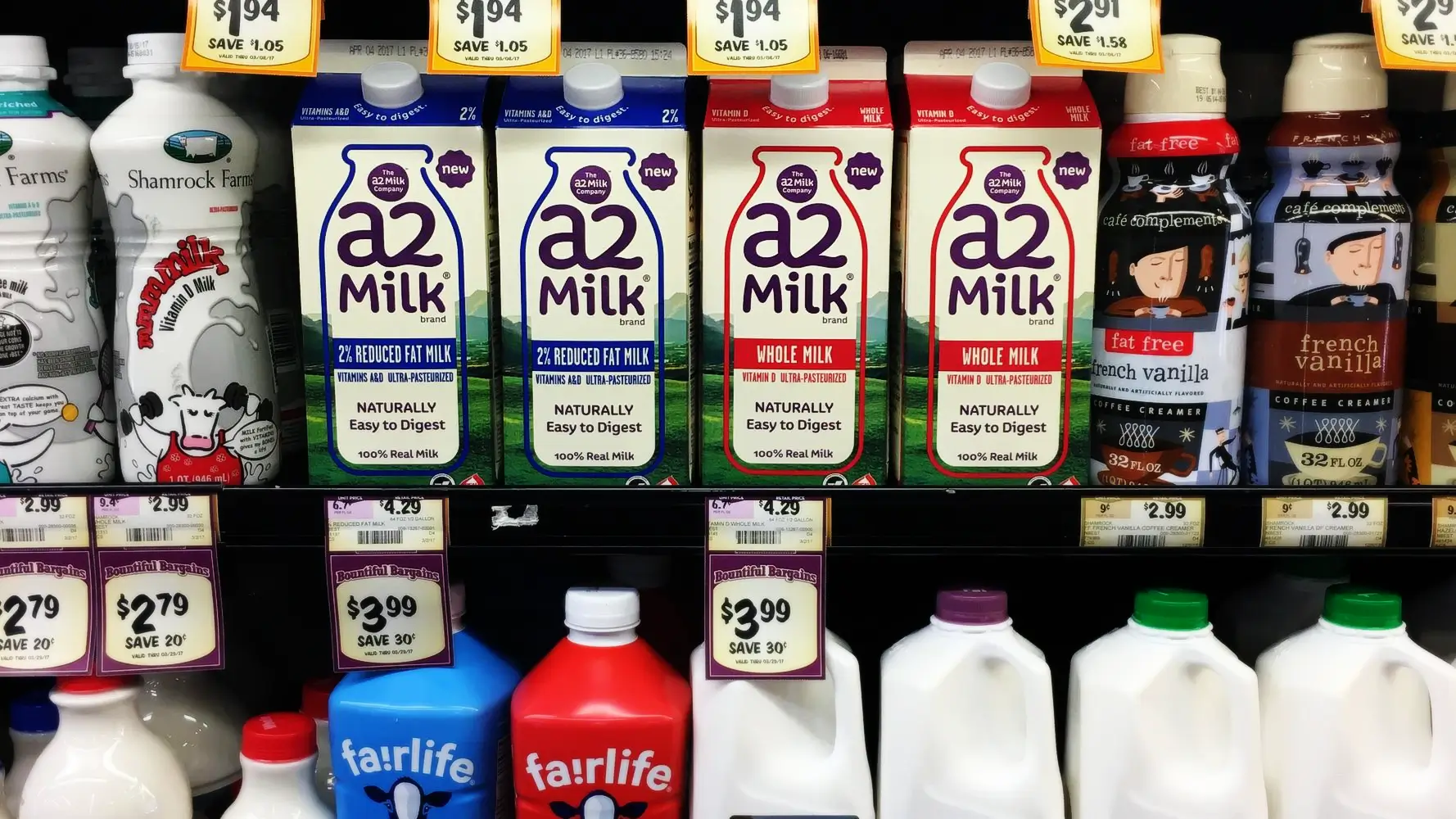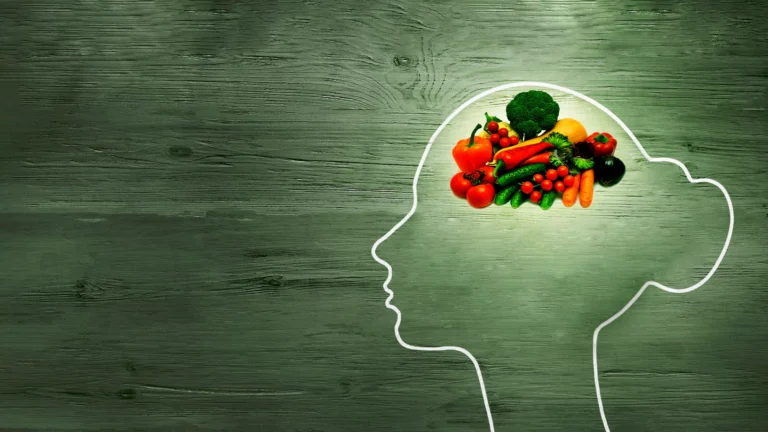Lactose intolerance- 65% chance you have it
People of European descent can drink milk and the rest of the globe has lactose intolerance. There are however substances in milk that none of us can tolerate.
Milos Pokimica
Written By: Milos Pokimica
Medically Reviewed by: Dr. Xiùying Wáng, M.D.
Updated May 7, 2023People of European descent can drink milk and the rest of the globe has lactose intolerance. Black Africans are 98 percent lactose intolerant and numbers for lactose intolerance in Asia are similar (Ugidos-Rodríguez et al.)[1].
Scientific research confirmed in different ancient European genome studies that the hunter-gatherers in Europe could not digest lactose in milk 8000 years ago. The first Europeans who domesticated wild animals were also unable to consume milk. The settlers who came from the Near East about 7800 years ago also had lactose intolerance. The Yamnaya pastoralists who came to Europe from the eastern steppes around 4800 years ago also had lactose intolerance.
It was not until about 2300 BC about 4300 years ago, in the early Bronze Age, that lactose tolerance swept through Europe (Gamba et al.)[2]. When we look at today’s world most of the population still can’t digest milk. If lactose-intolerant individuals consume lactose-containing products, they may experience bloating, nausea, abdominal pain, flatulence, and diarrhea.
Lactose is split down into a regular usable sugar by a specific enzyme called lactase created by cells in the wall lining of the small intestine (Storhaug et al.)[3]. Production of lactase is turned off in mammals in adulthood because mammals breastfeed only in the first periods after birth. Later in life in average conditions, it is not necessary to have this enzyme because no mammal will ever breastfeed again, except humans. Grown mammalian species do not breastfeed, and the organism is adapted to turn enzymes off to save energy. By domesticating wild animals and milking them, early farmers changed the condition of their habitat, and in time organisms adapted.
Today only descendants of European farmers can still digest milk. Black Africans cannot. Asians cannot. The statistic for lactose intolerance is like this. Approximately 65 percent of the entire human population has a reduced ability to digest lactose after infancy. In comparison, 5 percent of people of Northern European descent are lactose intolerant.
There are, however, a lot of substances in milk that we cannot tolerate. Even if we are from dairy queen countries we still can’t cope very well with things like cholesterol, a form of Lacto morphine called casomorphin, and estradiol (dairy consumption accounts for 60 to 80 percent of all estrogen consumed in the typical American diet). Opiates from the mother’s milk produce a sedative effect on the infant. That sedative effect is responsible for a good measure of the mother-infant bond. Milk has a drug-like effect on the baby (or other mammalian cubs), and it guarantees that the baby will bond with the mom and proceed to the nurse and get the nutrients. It is an evolutionarily beneficial adaptation. Similar to heroin or codeine, casomorphins slow intestinal movements and have an antidiarrheal effect. The opiate effect is the reason why cheese can be constipating just as opiate painkillers are.
Lactase is an enzyme that allows the organism to digest milk sugar, and that sugar is lactose. Danes are only 2% lactose intolerant.
All mammals after rejection from sucking are lactase deficient. They do not have contact with the milk later in life. The reactions of any organism that does not need to use the sugar lactose in adulthood are to deactivate the enzyme lactase so that the enzyme lactase is deactivated at the level of the genes. Except for the European farmers, which forced their bodies for thousands of years to consume it.
Thus, Danes today are only 2% non-tolerant, Finland 18%, Indians 50%, Israeli Jews 58%, African American 70%, Ashkenazi Jews 78%, Arabs 78%, Taiwanese 85%, Greek Cypriots 85%, Japanese 85%, Thailand 90%, Filipino 90%, Black African over 90% (Storhaug et al.)[3]. WHO has put that number up, saying that it is around 95% to 100%, for Indians 90 to 100, for Asians 90 to 95, for Mediterranean 60 to 75 and North American 10 to 15 and Europe 5 to 10 percent.
The real problem is that even if we are lactose tolerant lactose is metabolized in an unnatural way and is not meant to be consumed for an extended period of time. We have the enzyme lactase that breaks sugar lactose on dextrose and galactose. Half is glucose and the other half is galactose.
However, galactose cannot be used until it is digested in glucose. Cells only use glucose as fuel. There is an enzyme called beta-galactosidase that changes galactose into the glucose that we need. However, since no animal needs this enzyme after rejection, this enzyme is deactivated forever. Everyone, every human on the planet Earth if it is a grown individual has galactosidase deficiency. All of you who are reading this now and I have a deficiency of beta-galactosidase. This means that if you consume sugar from milk meaning lactose if you are lactose tolerant you can use it, you have lactase. Lactase metabolizes lactose and you will get glucose and besides it galactose. Glucose will be used normally. And with galactose, what are we going to do? We cannot use it so where does galactose go?
Some of it gets ejected outside through the skin. Some end up in the eyes and are stored in the cornea. Elderly cataracts come from galactose. Adults who consume large amounts of milk, and have high lactase activity, often suffer from galactose accumulation of galactitol in the eye lobe and have a high likelihood of elderly cataracts (Arola et al.)[4].
Not only that but it is also stored in the body in other places as well. Women are accumulating around the ovaries, and it is associated with cancer of the ovaries and infertility. One in four couples goes to infertility treatments in European countries. In African countries, where they do not use milk, they have no problems with infertility. It is unknown as a disease. In Daniel W. Cramer Harvard Medical School study (Mustafa et al.)[5] a link between the consumption of galactose and the increased risk of ovarian cancer was observed. Lactose-intolerant women are likely to consume less lactose. They concluded that: “This finding suggests that decreased lactose intake early in life may reduce ovarian cancer risk although further studies are needed to confirm this finding.” For Thai women, for example, who do not consume milk, there is no infertility at the level of statistical significance. In Thailand where 98% of adults are lactose intolerant, the average fertility among women aged 35-39 years was only 26% lower than the maximum rate for ages 25-29 years. In Australia and the UK, where lactose intolerance affects only 5% of adult people the fertility rates for 35-39 years old are full 82% below the maximum rate for 25-29 years.
Besides the risks of milk consumption in lactose-tolerant individuals can drink milk, what will happen when an individual that is not tolerant of lactose drinks milk? Sugar from milk will be undigested. It will cause lactose to be broken down by bacteria in the intestines. Bacteria will start to multiply, this increases osmotic pressure, fluid flows into the intestines, and the individual gets diarrhea.
After World War 2, the U.S. had a big stockpile of powdered milk that they had to dispose of somehow. Instead, they decided that because there is a “protein gap” they send that powdered milk to Africa as humanitarian aid. Many already malnourished children and babies got diarrhea from it. African countries that got milk powder sent as humanitarian aid experienced an increase in mortality, especially in small children who were already at the level of severe malnutrition.
References:
Passages selected from a book: Pokimica, Milos. Go Vegan? Review of Science Part 1. Kindle ed., Amazon, 2018.
- Ugidos-Rodríguez, Santiago, et al. “Lactose Malabsorption and Intolerance: A Review.” Food & Function, vol. 9, no. 8, Royal Society of Chemistry, Aug. 2018, pp. 4056–68. https://doi.org/10.1039/c8fo00555a.
- Gamba, Cristina et al. “Genome flux and stasis in a five millennium transect of European prehistory.” Nature communications vol. 5 5257. 21 Oct. 2014, doi:10.1038/ncomms6257
- Storhaug, Christian Løvold et al. “Country, regional, and global estimates for lactose malabsorption in adults: a systematic review and meta-analysis.” The lancet. Gastroenterology & hepatology vol. 2,10 (2017): 738-746. doi:10.1016/S2468-1253(17)30154-1
- Arola, H, and A Tamm. “Metabolism of lactose in the human body.” Scandinavian journal of gastroenterology. Supplement vol. 202 (1994): 21-5. doi:10.3109/00365529409091741
- Mustafa, Osama M., and Yassine J. Daoud. “Is Dietary Milk Intake Associated With Cataract Extraction History in Older Adults? An Analysis From the US Population.” Journal of Ophthalmology, vol. 2020, Hindawi Publishing Corporation, Feb. 2020, pp. 1–7. https://doi.org/10.1155/2020/2562875.
- Merritt, Melissa A et al. “Dairy foods and nutrients in relation to risk of ovarian cancer and major histological subtypes.” International journal of cancer vol. 132,5 (2013): 1114-24. doi:10.1002/ijc.27701
Do you have any questions about nutrition and health?
I would love to hear from you and answer them in my next post. I appreciate your input and opinion and I look forward to hearing from you soon. I also invite you to follow us on Facebook, Instagram, and Pinterest for more diet, nutrition, and health content. You can leave a comment there and connect with other health enthusiasts, share your tips and experiences, and get support and encouragement from our team and community.
I hope that this post was informative and enjoyable for you and that you are prepared to apply the insights you learned. If you found this post helpful, please share it with your friends and family who might also benefit from it. You never know who might need some guidance and support on their health journey.
– You Might Also Like –

Learn About Nutrition
Milos Pokimica is a doctor of natural medicine, clinical nutritionist, medical health and nutrition writer, and nutritional science advisor. Author of the book series Go Vegan? Review of Science, he also operates the natural health website GoVeganWay.com
Medical Disclaimer
GoVeganWay.com brings you reviews of the latest nutrition and health-related research. The information provided represents the personal opinion of the author and is not intended nor implied to be a substitute for professional medical advice, diagnosis, or treatment. The information provided is for informational purposes only and is not intended to serve as a substitute for the consultation, diagnosis, and/or medical treatment of a qualified physician or healthcare provider.NEVER DISREGARD PROFESSIONAL MEDICAL ADVICE OR DELAY SEEKING MEDICAL TREATMENT BECAUSE OF SOMETHING YOU HAVE READ ON OR ACCESSED THROUGH GoVeganWay.com
NEVER APPLY ANY LIFESTYLE CHANGES OR ANY CHANGES AT ALL AS A CONSEQUENCE OF SOMETHING YOU HAVE READ IN GoVeganWay.com BEFORE CONSULTING LICENCED MEDICAL PRACTITIONER.
In the event of a medical emergency, call a doctor or 911 immediately. GoVeganWay.com does not recommend or endorse any specific groups, organizations, tests, physicians, products, procedures, opinions, or other information that may be mentioned inside.
Editor Picks –
Milos Pokimica is a health and nutrition writer and nutritional science advisor. Author of the book series Go Vegan? Review of Science, he also operates the natural health website GoVeganWay.com
Latest Articles –
Top Health News — ScienceDaily
- The overlooked nutrition risk of Ozempic and Wegovyon February 4, 2026
Popular weight-loss drugs like Ozempic and Wegovy can dramatically curb appetite, but experts warn many users are flying blind when it comes to nutrition. New research suggests people taking these medications may not be getting enough guidance on protein, vitamins, and overall diet quality, increasing the risk of muscle loss and nutrient deficiencies.
- A 25-year study found an unexpected link between cheese and dementiaon February 4, 2026
A massive Swedish study tracking nearly 28,000 people for 25 years found an unexpected link between full-fat dairy and brain health. Among adults without a genetic risk for Alzheimer’s, eating more full-fat cheese was associated with a noticeably lower risk of developing the disease, while higher cream intake was tied to reduced dementia risk overall. The findings challenge decades of low-fat dietary advice but come with important caveats.
- MIT’s new brain tool could finally explain consciousnesson February 4, 2026
Scientists still don’t know how the brain turns physical activity into thoughts, feelings, and awareness—but a powerful new tool may help crack the mystery. Researchers at MIT are exploring transcranial focused ultrasound, a noninvasive technology that can precisely stimulate deep regions of the brain that were previously off-limits. In a new “roadmap” paper, they explain how this method could finally let scientists test cause-and-effect in consciousness research, not just observe […]
- Why heart disease risk in type 2 diabetes looks different for men and womenon February 4, 2026
Scientists are digging into why heart disease risk in type 2 diabetes differs between men and women—and sex hormones may be part of the story. In a large Johns Hopkins study, men with higher testosterone had lower heart disease risk, while rising estradiol levels were linked to higher risk. These hormone effects were not seen in women. The results point toward more personalized approaches to heart disease prevention in diabetes.
- Sound machines might be making your sleep worseon February 4, 2026
Sound machines may not be the sleep saviors many believe. Researchers found that pink noise significantly reduced REM sleep, while simple earplugs did a better job protecting deep, restorative sleep from traffic noise. When pink noise was combined with outside noise, sleep quality dropped even further. The results suggest that popular “sleep sounds” could be doing more harm than good—particularly for kids.
- This unexpected plant discovery could change how drugs are madeon February 3, 2026
Plants make chemical weapons to protect themselves, and many of these compounds have become vital to human medicine. Researchers found that one powerful plant chemical is produced using a gene that looks surprisingly bacterial. This suggests plants reuse microbial tools to invent new chemistry. The insight could help scientists discover new drugs and produce them more sustainably.
- A hidden cellular process may drive aging and diseaseon February 3, 2026
As we age, our cells don’t just wear down—they reorganize. Researchers found that cells actively remodel a key structure called the endoplasmic reticulum, reducing protein-producing regions while preserving fat-related ones. This process, driven by ER-phagy, is tied to lifespan and healthy aging. Because these changes happen early, they could help trigger later disease—or offer a chance to stop it.
PubMed, #vegan-diet –
- Diet type and the oral microbiomeon February 2, 2026
CONCLUSION: The diet-oral microbiome-systemic inflammation axis is bidirectional and clinically relevant. Understanding both direct ecological regulation and indirect metabolic effects is essential to support precision nutrition strategies aimed at maintaining oral microbial balance and systemic inflammatory risk mitigation.
- Consensus document on healthy lifestyleson January 22, 2026
Proteins are a group of macronutrients that are vital to our lives, as they perform various functions, including structural, defensive and catalytic. An intake of 1.0-1.2 g/kg/body weight per day would be sufficient to meet our needs. Carbohydrate requirements constitute 50 % of the total caloric value and should be obtained mainly in the form of complex carbohydrates. In addition, a daily intake of both soluble and insoluble fiber is necessary. Regular consumption of extra virgin olive oil […]
- Vitamin B12 and D status in long-term vegetarians: Impact of diet duration and subtypes in Beijing, Chinaon January 21, 2026
CONCLUSIONS: This study reveals a dual challenge among Beijing long-term vegetarians: vitamin B12 deficiency was strongly associated with the degree of exclusion of animal products from the diet (veganism), while vitamin D deficiency was highly prevalent and worsened with longer diet duration. The near-universal vitamin D deficiency observed in this study suggests that, in the Beijing context, the risk may extend beyond dietary choice, potentially reflecting regional environmental factors;…
- Nutritional evaluation of duty meals provided to riot police forces in Germanyon January 13, 2026
Background: The primary role of the German riot police is maintaining internal security. Due to challenging working conditions, riot police forces face an elevated risk of various diseases. During duty, forces are provided with meals. A balanced diet can reduce the risk of some of these diseases and contribute to health-promoting working conditions. Aim: First evaluation of the nutritional quality of duty meals in Germany based on German Nutrition Society recommendations (DGE). Methods: In…
- Iodineon January 1, 2006
Iodine is an essential trace nutrient for all infants that is a normal component of breastmilk. Infant requirements are estimated to be 15 mcg/kg daily in full-term infants and 30 mcg/kg daily in preterm infants.[1] Breastmilk iodine concentration correlates well with maternal urinary iodine concentration and may be a useful index of iodine sufficiency in infants under 2 years of age, but there is no clear agreement on a value that indicates iodine sufficiency, and may not correlate with […]
Random Posts –
Featured Posts –
Latest from PubMed, #plant-based diet –
- From paddy soil to dining table: biological biofortification of rice with zincby Lei Huang on February 4, 2026
One-third of paddy soils are globally deficient in zinc (Zn) and 40% of Zn loss in the procession from brown rice to polished rice, which results in the global issue of hidden hunger, e.g., the micronutrient deficiencies in the rice-based population of developing countries. In the recent decades, biofortification of cereal food crops with Zn has emerged as a promising solution. Herein, we comprehensively reviewed the entire process of Zn in paddy soil to human diet, including the regulatory…
- Molecular Characterization of Tobacco Necrosis Virus A Variants Identified in Sugarbeet Rootsby Alyssa Flobinus on February 3, 2026
Sugarbeet provides an important source of sucrose; a stable, environmentally safe, and low-cost staple in the human diet. Viral diseases arising in sugarbeet ultimately impact sugar content, which translates to financial losses for growers. To manage diseases and prevent such losses from occurring, it is essential to characterize viruses responsible for disease. Recently, our laboratory identified a tobacco necrosis virus A variant named Beta vulgaris alphanecrovirus 1 (BvANV-1) in sugarbeet…
- Nutrition in early life interacts with genetic risk to influence preadult behaviour in the Raine Studyby Lars Meinertz Byg on February 3, 2026
CONCLUSIONS: Nutrition in early life and psychiatric genetic risk may interact to determine lasting child behaviour. Contrary to our hypothesis, we find dietary benefits in individuals with lower ADHD PGS, necessitating replication. We also highlight the possibility of including genetics in early nutrition intervention trials for causal inference.
- Effect of the gut microbiota on insect reproduction: mechanisms and biotechnological prospectsby Dilawar Abbas on February 2, 2026
The insect gut microbiota functions as a multifunctional symbiotic system that plays a central role in host reproduction. Through the production of bioactive metabolites, gut microbes interact with host hormonal pathways, immune signaling, and molecular regulatory networks, thereby shaping reproductive physiology and fitness. This review summarizes recent advances in understanding how gut microbiota regulate insect reproduction. Accumulating evidence demonstrates that microbial metabolites…
- Rationale and design of a parallel randomised trial of a plant-based intensive lifestyle intervention for diabetes remission: The REmission of diabetes using a PlAnt-based weight loss InteRvention…by Brighid McKay on February 2, 2026
CONCLUSIONS: This trial will provide high-quality clinical evidence on the use of plant-based ILIs to address the epidemics of obesity and diabetes to inform public health policies and programs in Canada and beyond.
- Diet type and the oral microbiomeby Daniel Betancur on February 2, 2026
CONCLUSION: The diet-oral microbiome-systemic inflammation axis is bidirectional and clinically relevant. Understanding both direct ecological regulation and indirect metabolic effects is essential to support precision nutrition strategies aimed at maintaining oral microbial balance and systemic inflammatory risk mitigation.












